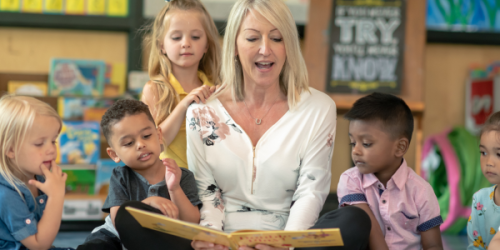States and school districts are both blessed and cursed over the wash of new federal funds coming their way, knowing that the funding serves no extended purpose beyond—pun-intended—a single shot in the arm. However welcome, schools must find a way of using this money to advance students’ real and compelling needs, without seeing that progress disappear once the funding dries up.
One obvious candidate is to tackle the nation’s literacy crisis, which by my study of the issue is the root cause of academic achievement disparities for Black and Hispanic students. Formerly daunting, formidable obstacles can now be the stuff of bold action with this windfall of new funding.
How else could we contemplate retraining three million preschool, elementary, and special education teachers, along with their school administrators? Or teacher educators, many of whom will continue to prepare the next generation of teachers long after the American Rescue Plan is a thing of the past?
How else are we to justify shelving the expensive classroom materials now found in most classrooms—resources best retired for having played their own sad role in making nonreaders out of a third of American kids, year after year?
The scale of change is significant, but just as the U.S. managed one of the most successful rollouts of COVID vaccines of any nation, so too can we dramatically improve the literacy rate in the nation.
Biden’s American Rescue Plan does indeed permit both states and districts to direct a sizable portion of their discretionary funds to such purposes, even allowing states to dedicate funds to retrain teacher educators. It also can be used to provide tutoring and small group instruction for the millions of kids in grades K through 3 who arguably lost the most important academic ground under the pandemic, and who only have a narrow window before they ‘age out’ and making up that ground will become inordinately difficult.
There are so many landmines to be navigated in fixing this problem that it’s hard to imagine a district, however large, forging its own path. Similar to vaccine rollouts, states must play a leadership role. States should implement a strong system of checks and balances—like setting standards in code that require teacher prep programs to teach evidence-based reading methods, requiring candidates to pass a strong licensing test in reading, resisting the urge to lower the recommended score needed to pass that test, reinvesting in their data systems to track progress—all for the purpose of keeping higher education institutions and schools on the right course, long after the funds are spent.
With this unprecedented level of funding now in hand, states acting together with school districts can muster a formidable force to combat illiteracy. Key steps include:
- Using state funds to provide intensive professional development and on-site coaching to every teacher educator in the state who teaches future teachers how to teach reading (the Mississippi model)—culminating with the requirement of an appropriately tough test at the end for the reading faculty.
- Providing job-embedded, ongoing professional development that is supported by reading coaches (as Mississippi, North Carolina and Arkansas are all doing) to every preschool, elementary, and special education teacher. Teachers need to unlearn what their own training and experience have reinforced all too well: that it is “normal” for some portion of their students, especially their Black and Hispanic students, to fail to learn how to read.
- Organizing the identification of high quality curricular materials on the state level (as Colorado and Arkansas have already done) and advancing the expectation that schools purchase from that list. With the right materials, teachers can have the essential tools they need to achieve a level of reading success they once thought impossible.
Perhaps most importantly of all, success needs to be celebrated, as there haven’t been too many rewarding moments for teachers as of late. Let’s not pretend that this effort does not involve a herculean re-tooling challenge for millions of educators coming on the heels of an exhausting, draining year, but it has the potential to offer what we all want most from our jobs: having an impact. There will emerge exemplary achievement that can serve to inspire and transform, amazing teacher educators to honor, educator prep programs that excel, teachers who change the trajectory of kids’ lives, and schools that knock it out of the park. As we’ve seen from the vaccine rollout, as we reach the milestone of half of eligible Americans receiving a vaccine, change on this scale is possible. This one is winnable.
More like this

Black History Month: Learning to read is a civil right

Research that moved minds: Top Teacher Quality Bulletin articles of 2024

The bigger picture: Why we need better reading instruction across all grades


